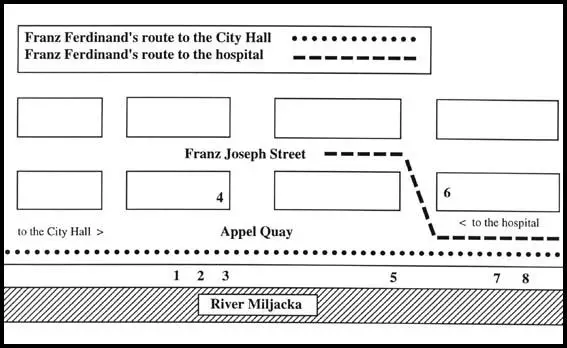Railway Station to City Hall
Just before 10 o'clock on Sunday, 28th June, 1914, Franz Ferdinand and Sophie von Chotkovato arrived in Sarajevo by train. General Oskar Potiorek, Governor of the Austrian provinces of Bosnia-Herzegovina, was waiting to take the royal party to the City Hall for the official reception.
In the front car was Fehim Curcic, the Mayor of Sarajevo and Dr. Gerde, the city's Commissioner of Police. Franz Ferdinand and Sophie von Chotkovato were in the second car with Oskar Potiorek and Count von Harrach. The car's top was rolled back in order to allow the crowds a good view of its occupants.
The local police force were in charge of the security arrangements for the royal visit. Before the arrival of Franz Ferdinand in Sarajevo, thirty-five potential troublemakers were arrested and taken into custody. A hundred and twenty policemen were placed along the route that the royal party was to take on its way to the City Hall but it was decided that the 70,000 Austro-Hungarian soldiers in Sarajevo were to be kept in their barracks.
Unknown to the Sarajevo police force, seven members of the Black Hand group also lined the route. They were spaced out along the Appel Quay, each one had been instructed to try and kill Franz Ferdinand when the royal car reached his position. The first conspirator on the route to see the royal car was Muhamed Mehmedbasic. Standing by the Austro-Hungarian Bank, Mehmedbasic lost his nerve and allowed the car pass without taking action. Mehmedbasic later said that a policeman was standing behind him and feared he would be arrested before he had a chance to throw his bomb.
The next man on the route was Nedjelko Cabrinovic. At 10.15. Cabrinovic stepped forward and hurled his bomb at the archduke's car. The driver accelerated when he saw the object flying towards him and the bomb exploded under the wheel of the next car. Two of the occupants, Eric von Merizzi and Count Boos-Waldeck were seriously wounded. About a dozen spectators were also hit by bomb splinters.
After throwing his bomb, Nedjelko Cabrinovic swallowed the cyanide he was carrying and jumped into the River Miljacka. Four men, including two detectives, followed him in and managed to arrest him. The poison failed to kill him and he was taken to the local police station.
Franz Ferdinand's driver, Franz Urban, drove on extremely fast and other members of the Black Hand group on the route, Cvijetko Popovic, Gavrilo Princip, Danilo Ilic and Trifko Grabez, decided that it was useless to try and kill the archduke when the car was going at this speed.

(1) Muhamed Mehmedbasic (2) Nedjelko Cabrinovic (3) Vaso Cubrilovic (4) Cvijetko Popovic (5) Gavrilo Princip (morning) (6) (afternoon) (7) Trifko Grabez (8) Danilo Ilic
Primary Sources
(1) Borijove Jevtic, was a member of the Black Hand group in Serbia in 1914.
A tiny clipping from a newspaper mailed without comment from a secret band of terrorists in Zagreb to their comrades in Belgrade, was the torch which set the world afire with war in 1914. The little clipping was from the Srobibran, a Croation journal of limited circulation, and consisted of a short telegram from Vienna. The telegram declared that the Austrian Archduke Franz Ferdinand would visit Sarajevo, the capital of Bosnia, 28 June, to direct army manoeuvres.
How dared Franz Ferdinand, not only the representative of the oppressor but in his own person an arrogant tyrant, enter Sarajevo on that day? Such an entry was a studied insult. 28 June is a date engraved deeply in the heart of every Serb, so that day has a name of its own. It is called vidounan. It is the day on which the old Serbian kingdom was conquered by the Turks at the battle of Amselfelde in 1389. That was no day for Franz Ferdinand, the new oppressor, to venture to the very doors of Serbia for a display of the force of arms which kept us beneath his heel. Our decision was taken almost immediately. Death to the tyrant!
(2) Fehim Curcic, the Mayor of Sarajevo, reception speech at the City Hall (28th June, 1914)
Our hearts are full of happiness over the most gracious visit with which Your Highnesses are pleased to honour our capital city of Sarajevo, and I consider myself happy that Your Highnesses can read in our faces the feelings of our love and devotion, of our unshakable loyalty, and of our obedience to His Majesty our Emperor and King, and to the Most Serene Dynasty of Hapsburg-Lorraine.
All the citizens of the capital city of Sarajevo find that their souls are filled with happiness, and they most enthusiastically greet Your Highnesses' most illustrious visit with the most cordial of welcomes, deeply convinced that this stay in our beloved city of Sarajevo will ever increase Your Highnesses' most gracious interest in our progress and well-being, and ever fortify our own most profound gratitude and loyalty, a loyalty that shall dwell immutably in our hearts, and that shall grow forever.
(3) Archduke Franz Ferdinand, speech at the official reception at the Sarajevo City Hall (28th June, 1914)
It gives me special pleasure to accept the assurances of your unshakable loyalty and affection for His Majesty, our Most Gracious Emperor and King. I thank you cordially for the resounding ovations with which the population received me and my wife, the more so since in them an expression of pleasure over the failure of the assassination attempt.

